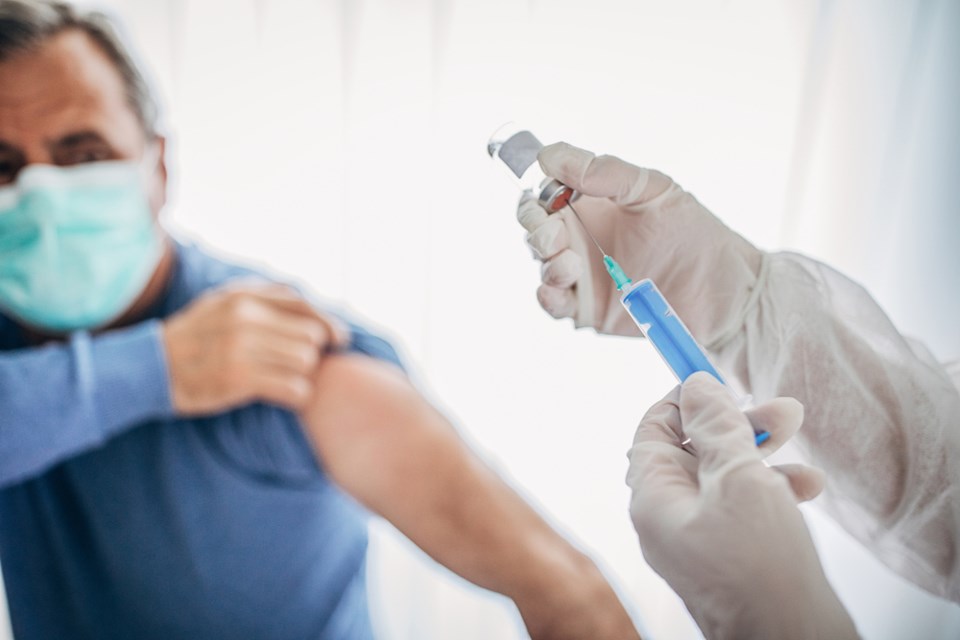As coronavirus cases surge across British Columbia, the province’s top doctor offered hope Thursday that a vaccine would be available in the first week of the new year.
And that most residents would receive a COVID-19 vaccine by September.
In an update Thursday afternoon, Dec. 3, provincial health officer Dr. Bonnie Henry said both the Pfizer-BioNtech vaccine and the Moderna vaccine were expected in early January, with other vaccines — AstraZeneca and Johnson & Johnson — expected by April 2021.
But with only six million doses available in the early months of 2021, Henry warned “that’s not enough for everybody” and that “we’ll need to sequence it because we can’t do everyone at once.”
Henry said seniors in long-term care homes and hospitals will be the first to get a vaccine against COVID-19 as the province rolls out an immunization program — now dubbed “Operation Immunization” — in the coming weeks.
That’s in line with preliminary guidance provided by the National Advisory on Immunization (NACI), which prioritizes advanced age and other high-risk health conditions.
Roughly 74% of COVID-19 deaths in Canada and 45% in B.C. have been traced to seniors in long-term care facilities, and earlier this week, Canada’s chief medical health officer Dr. Theresa Tam said data indicated that age has proven to trump all other risk factors among those who have died of the virus.
Next in line, according to NACI, include health care workers, caregivers — both essential to maintaining the COVID-19 response — and household contacts of those with high-risk of severe illness due to COVID-19.
A third tier includes first responders and people forced to work in public as essential services, such as grocery store clerks. However, Henry's office will have final word on how vaccinations are rolled out.
Canada has spent more than $1 billion to secure up to 414 million doses of candidate vaccine from seven suppliers, according to Minister of Public Services and Procurement Anita Anand. Another $284.2 million has been spent at the federal level to bolster the capacity to distribute vaccines.
Internal data on the Pfizer and Moderna vaccine candidates show they are both roughly 95% effective.
On Tuesday, the United Kingdom was the first to approve the use of the Pfizer vaccine, indicating it will begin shots within days. The U.S. Food and Drug Administration, meanwhile, is scheduled to make its decision on the vaccine Dec. 10. While Dr. Henry noted Thursday she’s hopeful the vaccine will be approved soon in Canada, Canadian authorities have reiterated they would not rush Health Canada’s review of its efficacy and safety.
Both the Pfizer and Moderna vaccines need to be kept at low temperatures to survive the gap between when they are manufactured and when they are administered to a patient.
Moderna’s vaccine requires refrigeration at minus 20 degrees Celsius, whereas the Pfizer vaccine requires a chilly minus 70, colder than the average winter temperature in Antarctica. Together with Canada’s existing capacity, Anand said Tuesday the country can now store 33.5 million vaccine doses under cold and ultra-cold conditions.
Once the vaccines arrive, the other side of storage is distribution. Last week, Trudeau tapped former NATO commander Maj.-Gen. Dany Fortin to lead the national distribution effort, and Anand said the federal government anticipates having distribution contracts in place over the coming days.
In British Columbia, the province's point-person on the initiative, Dr. Ross Brown, joined provincial and federal counterparts in talks to walk through exactly how vaccines will be distributed, according to Henry.
The discussions involved key representatives from the BC Centre for Disease Control and others, and were intended as a dry run to walk through the key steps of vaccine delivery, the immunization process and "to anticipate any of the challenges or roadblocks that might come up."
So long as the vaccine continues to come in and as long as its safety and effectiveness reaches Health Canada’s threshold, Dr. Henry said all British Columbians will soon be given the option to get inoculated against the coronavirus.
“But it will take some time,” she added. “All of our planning constructs is to start the first week of January and to hope to have everybody done by September of next year.”
“We expect there will be a good lot of people immunized by the summer and through the fall next year.”
— With files from Glen Korstrom and the Canadian Press



